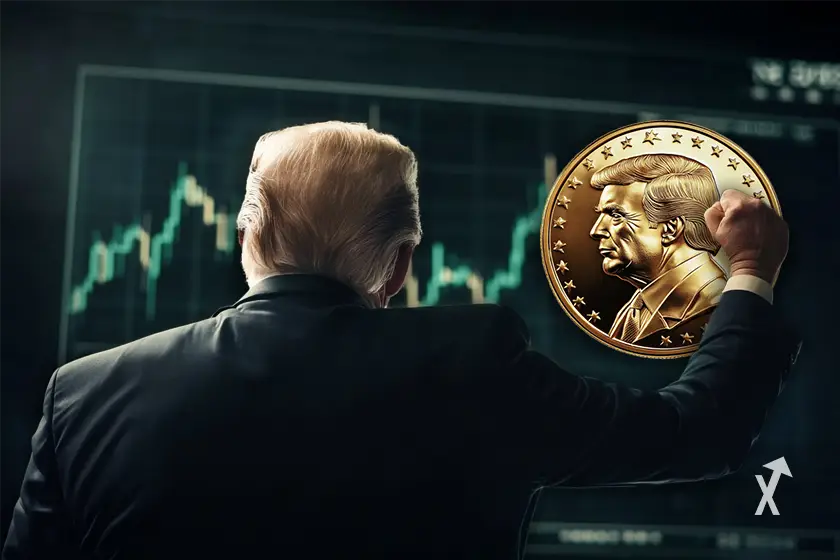What is a crypto broker ?
A broker is the intermediary between investors and the crypto market.
If you use a broker, you will simply deposit your funds into the broker’s account. You can then place trades on the various financial products offered by brokers (always related to cryptocurrencies).
In some cases, the broker can also execute the transaction.
Say you use a cryptocurrency broker. I am depositing Dogecoin but I want to leverage the SOL/ETH pair. Up to the number of Dogecoin I own, I could then trade on the SOL/ETH pair. If I am in the classic cryptocurrency market, I should first convert my Dogecoin to Solana or Ethereum.
The difference between an exchange and a broker
Exchanges are usually where new cryptocurrency investors go.
An exchange, unlike a broker, is an online platform where users can trade and stake cryptocurrencies directly from their online wallet (crypto wallet).
It allows buyers to get crypto with their fiat currency (dollars, euros, yen, etc.) and keep it on the exchange. Brokers have the advantage of having much lower transaction fees than on exchanges.
For example, the Swissborg exchange platform offers a rate of 1% on each transaction, which can be huge when you want to trade several pairs.
Example : an investor deposits 1000 euros to buy USDT which he then converts into ETH: he then loses 20 euros in transaction costs.
There are 2 types of exchange platforms :
- Centralized exchanges called CEX;
- Decentralized exchanges called DEX.
Centralized Exchanges (CEX)
Centralized exchanges are the most common platforms for trading and staking crypto-assets. Centralized exchanges use a third party to carry out the transactions.
It is a concept that therefore derogates from decentralization, which is the primary advantage of cryptocurrencies. Indeed, using a centralized exchange is, in comparison, using a bank, because a central body controls and secures the exchanges.
This is, for example, the case of centralized exchange platforms: Binance and Crypto.com.
Decentralized Exchanges (DEX)
Unlike centralized exchanges, DEXs use blockchain technology. These are less common and more used to exchange new cryptocurrencies when they are released, commonly called “shitcoins”.
With these decentralized exchanges, the crypto-assets are not held by a central body. Transactions are carried out using smart contracts.
PooCoin and Pancakeswap are decentralized exchange platforms.
The difference with a broker?
Using a broker is much more practical for large portfolios, where security, liquidity and advice are much more valued. You can then choose your services provided by the specific broker (leverages, which cryptos, etc.). a centralized organization through which you carry out your exchanges in cryptocurrency, in return for a few fees.
The big difference between the broker and the exchange is the target audience. Those who go through an exchange are largely Holders, who aim for the long term and invest accordingly.
What should we think of crypto brokers? Our opinion
Brokers have their pros and cons. With what we have just said, and objectively, here are the positive and negative points when using a broker to trade your cryptos.
Advantages of the crypto broker
- Security : They are regulated by the financial authorities in force in their country;
- More liquidity : Brokers have access to a larger network of liquidity providers;
- Additional services : analysis of the cryptocurrency market and trends to help you with your investment choices and trading strategies;
- More complete after-sales service : Brokers generally respond more quickly to your questions, and in a more personalized way
Disadvantages of the crypto broker
You may not be able to take advantage of large market moves to the same extent as with an exchange.
Brokers generally list fewer cryptocurrencies than exchanges. For comparison, there are more than 200 different crypto-assets on Crypto.com or Binance compared to a few dozen for a broker like eToro.
This naturally results in a lighter referencing: you will certainly not be able to take advantage of major market volatility (rises and falls).
Top 5 best crypto brokers
Here we have listed the main cryptocurrency brokers. Of course, there are others, but these are the main players.
Vantage
Founded in 2009, Vantage is one of the leaders in its market. Vantage is 0% commissions and the possibility of creating a demo account to practice and become familiar with trading. The possibilities of investing in cryptocurrencies are quite limited; we only find the following cryptos: BTC; ETH, DASH, XRP.
eToro
On all the criteria and aspects to consider, eToro ticks all the boxes. Whether in terms of safety and ease of use. You can even do copy trading and follow large portfolios of investors. eToro has a fairly limited range of cryptocurrencies, but the main crypto-assets are there: BTC, ETH, XRP, DASH, UNI, DOGE, BNB…
Bitpanda
Bitpanda is an excellent broker that will allow you to make your investments in cryptocurrency. You can even take advantage of your earnings by spending them directly on your purchases with the Bitpanda card.
Revolut
Revolut is the neobank par excellence! Fast, convenient and secure, it attracts millions of users. Revolut also allows you to invest directly in stocks and cryptocurrencies on your app. In short, it is an all-in-one platform !
XTB
XTB is a very serious broker. With this intermediary, you can take advantage of minimal fees, a good choice of cryptocurrencies and all possible trading options (long, short, etc.).

















